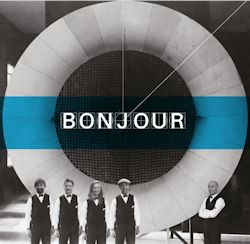 BUY NOW AmazonUK AmazonUS |
Florent Ghys Bonjour CANTALOUPE CA21120 [49:39] |
Friday 3pm
Wednesday
Thursday Afternoon
Sunday
Monday Morning
Thursday Morning
Tuesday Noon Around 12:21
Ashley Bathgate (cello): Eleonore Oppenheim (double bass, voice): James Moore (guitar): Owen Weaver (percussion, voice): Florent Ghys (double bass, voice)
Recorded by Henry Hirsch, Hudson, NY, no date
It’s not easy to characterise the 50 minutes to be heard on Bonjour. It uses the conceit of tracks being called after days of the week – sometimes very specifically timed – and thereby seems to suggest a shifting narrative that reflects either the morning or afternoon nature of things. So far, so opaque.
The string-based textures – cellos, guitar, bass, percussion with vocals – are powered by composer and leader, bassist Florent Ghys. It’s he that ensures that sonic adventure is on the cards. Thus, there’s a somewhat Reichian element (as in Steve) to Friday 3pm that seems to celebrate its Minimalist credentials but that soon generates an evolving groove with embedded wordless vocals that takes the music far from its original source, not least the brief rockier vibe toward the end. Much different is Wednesday, a mid-week affair that opens with an angular bass motif and hard-kicking percussion, insistent and driving, that seems to imply a rather unremitting narrative for that day.
Thursday Afternoon suggests a consolidation between Minimalist impressions and rhythmic angularity, with a Rock back-beat later reinforcing the plurality of inspirations to be encountered – a kind of engine drone perhaps depicting an urban scene. Sunday is appropriately calmer – the days do not run consecutively in weekly diary form – with mid-tempo lines emerging over a repeating lower string pattern and little glockenspiel-type contributions. It’s quite leisurely and romantic. A Babel of voices and unremitting ensemble bowing is encountered in the very different Monday Morning – the repetitions indicative of an angst filled part of the day dissipated by the following track Thursday Morning , where a springy warm pizzicato buzz irradiates the aural landscape.
So, not an easy disc to sum up. Its unconventionality lies in its use of different stylistic impressions – the chugging Classical Minimalism, insinuations of narrative incident, pockets of string wash and colour, Rock percussion, and so on. Where it fails is in a repetitiousness that is not linked to Minimalism but where it does succeed it does so because of its compositional variety.
Jonathan Woolf